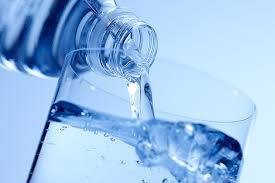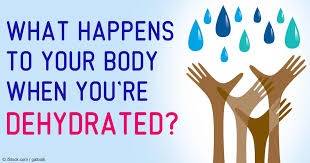Staying safe in the sun and hydrated in the heat



Summer 2017 and the temperatures have been relentless. We are still coping with triple-digit numbers and those in the 90s. It’s become truly unbearable. Summer in Las Vegas is no joke.
Dr. Laurine Tibaldi, chief medical officer for UnitedHealthcare’s Health Plan of Nevada, says its OK to have fun in the sun: but it’s important to stay hydrated. We’ve been told that time and time again and yet people still ignore the warnings. According to the National Hydration Council, dehydration is defined as, “a lack of water in the body resulting from inadequate intake of fluids or excessive loss through sweating, vomiting or diarrhea.”
Says Tibaldi: “Hydration is particularly important for children, as they have higher water requirements in relation to their body weight than adults. However, kids don’t always recognize the early stages of thirst, which can make them particularly vulnerable to becoming dehydrated, especially during times that can drive up their body fluid losses, like when they are playing sports or during warm weather.
“While it can be a challenge to keep up with regular outdoor exercise regimen or playtime in the great outdoors during the hot weather months, it is important to stay active to stay healthy. To maximize open-air fun, here are some safety tips for adults and children for staying cool when exercising and playing in the summer heat:
• Exercise in the early morning or late evening: The temperature is coolest at this time. Avoid exercising midday because it’s the hottest part of the day.
• Drink up: Do not wait until you are thirsty to start hydrating. Drink two to four glasses of water each hour. If you are exercising for an extended period of time, drink a sports beverage to replace the salt and minerals you lose through sweat. If you are on diuretics, or a low-salt or fluid-restricted diet, talk to your doctor first about your specific fluid needs.
• Wear lightweight, loose-fitting clothing: Consider dressing in clothes made with moisture-wicking fabric.
• Protect yourself from the sun: Wear a hat, sunglasses and sunscreen with an SPF rating of 15 or higher. Try to exercise in the shade. Play tennis on a court shaded by the trees or take a walk in a wooded park.
• Rest early and often: Take breaks in shady areas.
• Gradually get used to the heat: It takes seven to 10 days for your body to adapt to the change in temperature. Start by exercising for a short time at a low intensity. Save long, hard workouts until you are acclimated to the summer air.
• Mind the weather: Do not exercise on the hottest days. Keep an eye on the heat index. The heat index is a calculation of the temperature and humidity. It measures “how hot it really feels” outside:
— Heat index 80 to 90 degrees: fatigue during exercise is possible. Heat exhaustion is a possibility even at these temperatures.
— Heat index of 90 to 105 degrees: heat cramps and heat exhaustion or heat stroke are possible.
— Heat index of 105 or higher: heat exhaustion is likely and heat stroke is possible.
• Be cautious when the heat index gets above 80 degrees. Consider working out indoors. Walk around a shopping mall or do a workout DVD in your air-conditioned home.
• Stop if you don’t feel well: If you have any of the warning signs of heat-related illness, stop your workout right away.
“Dehydration is one of those things many people don’t think about and something that can sneak up on you. It’s important to learn the facts on how to stay healthy and happy while enjoying summertime in Las Vegas.
“Sweltering days can be too hot to handle and it can go beyond uncomfortable — the heat can sometimes be dangerous. Staying safe in the hot Las Vegas sun can be hard to do when the sun is so strong.
“Avoiding sun exposure can help prevent and lower your risk of skin cancer. Here are some tips that can help you protect yourself:
• Seek shade: Don’t stay out in direct sunlight for too long. The sun’s rays are strongest between 10 a.m. and 4 p.m. That’s the time to stay in the shade.
• Put on a hat: A hat with a wide brim is a good choice. So is a shade cap – a billed cap with fabric down the sides and back. Baseball caps and straw hats offer less protection.
• Wear sunglasses: Sunglasses protect your eyes from UV rays. Wraparound styles work best. Choose ones that block both UVA and UVB rays.
• Wear protective clothes: Cover as much of your skin as possible. Dark colors and tightly woven fabrics offer the most protection.
• Use lip balm: Protect your lips by wearing lip balm that contains sunscreen with a sun protection factor (SPF) of 15 or higher.
• Use sunscreen: Choose a broad-spectrum, water-resistant sunscreen with an SPF rating of 15 or higher. Some experts recommend SPF 30. Apply it generously to all exposed skin before you go outside. Reapply it at least every two hours, or after swimming or sweating. You should follow these rules even if it’s cloudy. Also, check the sunscreen’s expiration date. Sunscreen that doesn’t have an expiration date isn’t good for more than three years — less if it’s been exposed to high temperatures.
• Take extra care near water, snow and sand: All of these surfaces reflect and intensify the sun’s damaging rays, increasing your chances of sunburn.
“Not going in the sun but still trying to beat the heat? Try these sizzle-free tips for comfort and safety:
• Chill indoors: As much as possible, stay where it’s air-conditioned. No air-conditioning at home? Spend time in a cool public place, such as a library or mall.
• Drink up: Drink water or other nonalcoholic, low-sugar liquids before you are thirsty. When working outdoors, drink two to four cups of water per hour.
• Be an early bird or night owl: The sun is strongest in the middle of the day. To avoid midday heat, try to schedule outdoor activities in the morning or early evening. For example, plan to walk the dog to start the day or do a little gardening after dinner.
• Keep the oven off: Turning on the stove or oven will raise the temperature indoors. Instead of cooking a hot meal, make a cold sandwich, or a cool and tasty salad using water-rich foods like tomatoes and cucumbers.
• No parking for kids or pets: Never leave a child or pet in a parked car — even with the windows open. Vehicles can get dangerously hot inside. It can happen quickly — and be deadly.
There’s still more than 30 days of summer ahead of us before it officially ends on Sept. 22, so heed Dr. Laurine’s advice.












